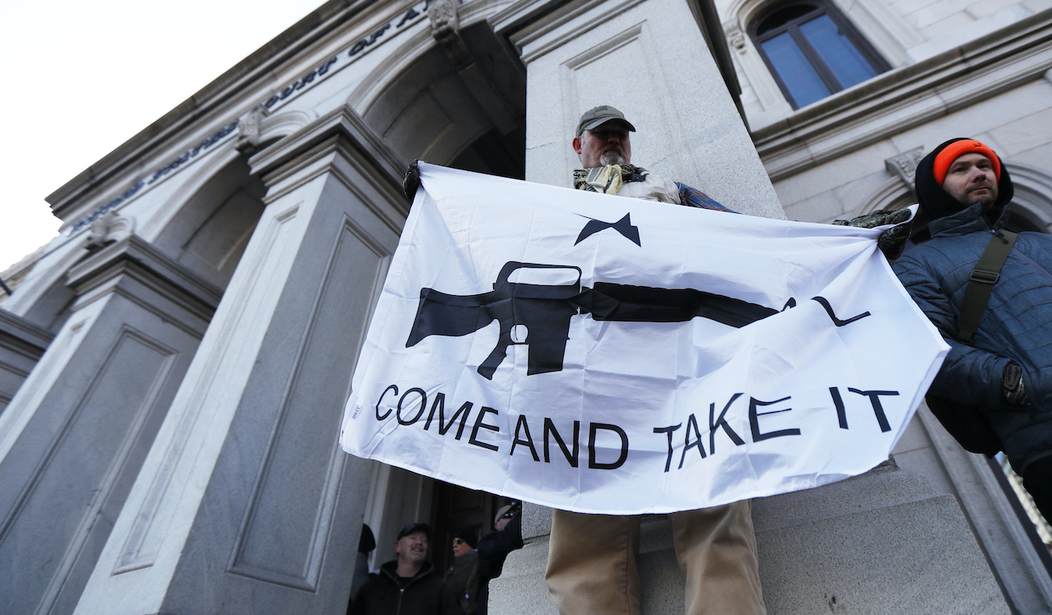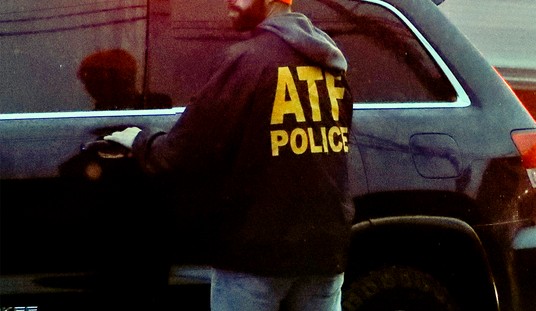Earlier today, I wrote about the quiet surge in support for Second Amendment Sanctuaries in North Carolina, where more than half of the state’s counties have now passed resolutions backing the rights of citizens to keep and bear arms. It’s not just North Carolina where the movement is surging with little notice from the national media. In Kentucky, all but twelve counties have now signed on to resolutions or ordinances declaring themselves to be safe havens for the right to bear arms, which is pretty incredible, given that the movement really only began in early December.
As USA Today reports, however, the Second Amendment Sanctuary movement in the state has now splintered, and the tale is a cautionary one for gun owners around the country.
A lot of the Second Amendment Sanctuary movement’s energy can be found online, with local and statewide Facebook groups helping to both inform gun owners and give them a gathering spot to talk together. In Kentucky, that Facebook group was called Kentucky United, founded by a guy named John Cartwright. As the Second Amendment Sanctuary movement took off in the state, so did Kentucky United, and eventually about 90,000 people were members. According to USA Today, while Cartwright and other leaders in the group like Courtney Griffeith wanted the group to be apolitical and focused solely on the Second Amendment, other members had other ideas.
“We didn’t want anyone to be left out, no matter where you were,” Cartwright said. “I was wanting the page to be on the same morals that our Constitution was founded on.”
The reality, though, has been different.
A Courier Journal review of the group’s Facebook page found multiple posts that attack liberals or accuse Democratic lawmakers of committing treason for sponsoring gun-control bills.
Other members have shared right-wing conspiracy theories, left blatantly Islamophobic comments, or made threats of violence.
One member, responding to a comment about a plan by Democrats to take guns “a step at a time,” wrote: “and we fight back a bullet at a time.”
Another member wrote: “It’s time to cleanse the tree of liberty with the blood of tyrants and patriots alike.”
The rhetoric has carried beyond social media.
At a hastily organized gun-rights rally Jan. 15 outside the statehouse in Frankfurt, a small group of Kentucky United members joked about coming back a few days later to barbecue pork during Muslim Day at the Capitol.
Both Cartwright and Griffieth have condemned such behavior.
“We try to weed out those people and completely block them from being involved with us,” Griffieth said. But, she added, “you’re always going to get people in there that sneak in and say stuff that does not go along with what we’re representing.”
She dismissed it as just “talk” when people say they are willing to use violence, if necessary, to defend their rights to own guns.
“It’s just like my dog,” Griffieth said. “She’ll bark at you. She’ll growl at you. She’ll make you think she’s going to eat your face off. But if you come up and pet her, she’ll lick you. She’s all bark, which is what a lot of people are.”
Okay, quick tangent before we get back to the Second Amendment Sanctuary movement in Kentucky. I think that the Second Amendment is ultimately about the right of self-defense, which does include the right of the People do defend themselves against a tyrannical government. However, I don’t believe would include some group of boogaloo boyz deciding they’re going to spark off a revolution. James Madison actually explained the “in case of emergency, break glass” scenario and how it would work in Federalist 46. Let’s say a tyrannical federal government is established, argues Madison. What happens next?
Let a regular army, fully equal to the resources of the country, be formed; and let it be entirely at the devotion of the federal government; still it would not be going too far to say, that the State governments, with the people on their side, would be able to repel the danger. The highest number to which, according to the best computation, a standing army can be carried in any country, does not exceed one hundredth part of the whole number of souls; or one twenty-fifth part of the number able to bear arms. This proportion would not yield, in the United States, an army of more than twenty-five or thirty thousand men. To these would be opposed a militia amounting to near half a million of citizens with arms in their hands, officered by men chosen from among themselves, fighting for their common liberties, and united and conducted by governments possessing their affections and confidence. It may well be doubted, whether a militia thus circumstanced could ever be conquered by such a proportion of regular troops. Those who are best acquainted with the last successful resistance of this country against the British arms, will be most inclined to deny the possibility of it. Besides the advantage of being armed, which the Americans possess over the people of almost every other nation, the existence of subordinate governments, to which the people are attached, and by which the militia officers are appointed, forms a barrier against the enterprises of ambition, more insurmountable than any which a simple government of any form can admit of. Notwithstanding the military establishments in the several kingdoms of Europe, which are carried as far as the public resources will bear, the governments are afraid to trust the people with arms. And it is not certain, that with this aid alone they would not be able to shake off their yokes. But were the people to possess the additional advantages of local governments chosen by themselves, who could collect the national will and direct the national force, and of officers appointed out of the militia, by these governments, and attached both to them and to the militia, it may be affirmed with the greatest assurance, that the throne of every tyranny in Europe would be speedily overturned in spite of the legions which surround it.
In other words, the right of the people to keep and bear arms is a check on the establishment of a tyrannical government. This makes sense, given that the the Constitution was designed as a system of checks and balances. Yes, the new federal government will have more power than that under the Articles of Confederation, argues Madison. But that power will be checked by the body of the people bearing arms, as well as the local governments chosen by themselves who can, collectively, direct the national force of will in opposition to tyranny.
Which brings us back to the Second Amendment Sanctuary movement in Kentucky, which is another manifestation of local action being channeled into a larger force, though the object in this case is to appeal to state lawmakers to reject legislation that would infringe on their rights, as opposed to responding to a national government’s descent into tyranny.
Kentucky United, which really took off just a few weeks ago, has already splintered into two groups. Now gun owners in the state have to figure out if they want to be a part of Kentucky United, United Kentucky, both, or neither.
Kentucky United’s ranks have since dropped to 77,000 after Griffieth and other leaders split to form their own private Facebook group, United Kentucky, which has 15,000 members.
Cartwright sees the group stepping further into politics, with some Kentucky United leaders running to unseat county leaders who have not been sufficiently supportive of gun ownership.
He’s also trying to get his criminal record expunged, to restore his right to own guns and, possibly, to one day run for office.
Griffieth, meanwhile, is in her last semester at Eastern Kentucky University. After graduation, she hopes to land a job as an investigator with the Kentucky State Police.
To date, all but 12 of Kentucky’s 120 counties have adopted versions of a 2A sanctuary resolution.
Republican state Rep. Savannah Maddox has filed a statewide resolution this legislative session that urges the General Assembly to oppose red flag laws or “any legislation intended to infringe upon a law-abiding citizen’s right to keep and bear arms. …”
Griffieth hopes lawmakers will take that a step further and pass “legitimate legislation” that, once and for all, protects Kentuckians’ Second Amendment rights.
“Having the county support,” she said, “is really going to help for a state push.”
I’ve written before about the decentralized nature of the Second Amendment Sanctuary movement, and how that can be a positive going forward as advocates continue to work at the local level in small groups to achieve big results statewide or potentially even nationally. The downside to the decentralization is that you can have a lot of groups rowing in different directions, and with different agendas in mind, which can make us less effective, particularly when are opposition is well-organized and well-funded.
I decided long ago that my support for the Second Amendment rights of all Americans meant all Americans, even those I disagree with politically, socially, or culturally. And because I’m committed to being as effective as possible when it comes to protecting our right to keep and bear arms, I’m willing to work alongside those I might disagree with politically, socially, or culturally as long as we’re both willing to put the Second Amendment first. As far as I’m concerned, the pro-Second Amendment movement should be the biggest tent in politics, and I think for the most part it is.
One of the reasons we were able to beat back Ralph Northam’s gun ban bill in the legislature is that the opposition to the bill was so broad. Socialist Del. Lee Carter voted against the bill in the House, along with every Republican and a few Democrats. On the Richmond streets during Lobby Day, you had Virginians from across the state in attendance, and while there were plenty of rural white guys like me there, the crowd was a cross section of the state, with all races, colors, and creeds represented.
The bigger the tent, the bigger the movement. I’m not just fighting for my right to keep and bear arms, I’m fighting for THE right to keep and bear arms. Hopefully the surge in interest in Second Amendment activism will continue in Kentucky, but if the Second Amendment Sanctuary movement turns into just another group of conservatives advocating for conservative causes, I fear it will lose its unique foundation and its driving force. I don’t think that’s the case yet, and I hope it doesn’t come to pass.









